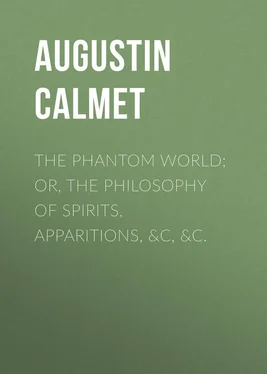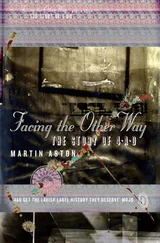Augustin Calmet - The Phantom World; or, The philosophy of spirits, apparitions, &c, &c.
Здесь есть возможность читать онлайн «Augustin Calmet - The Phantom World; or, The philosophy of spirits, apparitions, &c, &c.» — ознакомительный отрывок электронной книги совершенно бесплатно, а после прочтения отрывка купить полную версию. В некоторых случаях можно слушать аудио, скачать через торрент в формате fb2 и присутствует краткое содержание. Жанр: foreign_antique, foreign_prose, на английском языке. Описание произведения, (предисловие) а так же отзывы посетителей доступны на портале библиотеки ЛибКат.
- Название:The Phantom World; or, The philosophy of spirits, apparitions, &c, &c.
- Автор:
- Жанр:
- Год:неизвестен
- ISBN:нет данных
- Рейтинг книги:3 / 5. Голосов: 1
-
Избранное:Добавить в избранное
- Отзывы:
-
Ваша оценка:
- 60
- 1
- 2
- 3
- 4
- 5
The Phantom World; or, The philosophy of spirits, apparitions, &c, &c.: краткое содержание, описание и аннотация
Предлагаем к чтению аннотацию, описание, краткое содержание или предисловие (зависит от того, что написал сам автор книги «The Phantom World; or, The philosophy of spirits, apparitions, &c, &c.»). Если вы не нашли необходимую информацию о книге — напишите в комментариях, мы постараемся отыскать её.
The Phantom World; or, The philosophy of spirits, apparitions, &c, &c. — читать онлайн ознакомительный отрывок
Ниже представлен текст книги, разбитый по страницам. Система сохранения места последней прочитанной страницы, позволяет с удобством читать онлайн бесплатно книгу «The Phantom World; or, The philosophy of spirits, apparitions, &c, &c.», без необходимости каждый раз заново искать на чём Вы остановились. Поставьте закладку, и сможете в любой момент перейти на страницу, на которой закончили чтение.
Интервал:
Закладка:
In all the predictions of diviners or oracles, when they are followed by fulfilment, we can hardly disavow that the evil spirit intervenes, and discovers the future to those who consult him. St. Augustine, in his book de Divinatione Dæmonum , 199 199 Aug. de Divinat. Dæmon. c. 3, pp. 507, 508, et seq.
or of predictions made by the evil spirit, when they are fulfilled, supposes that the demons are of an aërial nature, and much more subtile than bodies in general; insomuch that they surpass beyond comparison the lightness both of men and the swiftest animals, and even the flight of birds, which enables them to announce things that are passing in very distant places, and beyond the common reach of men. Moreover, as they are not subject to death as we are, they have acquired infinitely more experience than even those who possess the most among mankind, and are the most attentive to what happens in the world. By that means they can sometimes predict things to come, announce several things at a distance, and do some wonderful things; which has often led mortals to pay them divine honors, believing them to be of a nature much more excellent than their own.
But when we reflect seriously on what the demons predict, we may remark that often they announce nothing but what they are to do themselves. 200 200 Idem. c. 5.
For God permits them, sometimes, to cause maladies, corrupt the air, and produce in it qualities of an infectious nature, and to incline the wicked to persecute the worthy. They perform these operations in a hidden manner, by resources unknown to mortals, and proportionate to the subtilty of their own nature. They can announce what they have foreseen must happen by certain natural tokens unknown to men, like as a physician foresees by the secret of his art the symptoms and the consequences of a malady which no one else can. Thus, the demon, who knows our constitution and the secret tendency of our humors, can foretell the maladies which are the consequences of them. He can also discover our thoughts and our secret wishes by certain external motions, and by certain expressions we let fall by chance, whence he infers that men would do or undertake certain things consequent upon these thoughts or inclinations.
But his predictions are far from being comparable with those revealed to us by God, through his angels, or the prophets; these are always certain and infallible, because they have for their principle God, who is truth; while the predictions of the demons are often deceitful, because the arrangements on which they are founded can be changed and deranged, when they least expect it, by unforeseen and unexpected circumstances, or by the authority of superior powers overthrowing the first plans, or by a peculiar disposition of Providence, who sets bounds to the power of the prince of darkness. Sometimes, also, demons purposely deceive those who have the weakness to place confidence in them. But, usually, they throw the fault upon those who have taken on themselves to interpret their discourses and predictions.
So says St. Augustine; 201 201 S. August. in his Retract. lib. ii. c. 30, owns that he advanced this too lightly.
and although we do not quite agree with him, but hold the opinion that souls, angels and demons are disengaged from all matter or substance, still we can apply his reasoning to evil spirits, even upon the supposition that they are immaterial – and own that sometimes they can predict the future, and that their predictions may be fulfilled; but that is not a proof of their being sent by God, or inspired by his Spirit. Even were they to work miracles, we must anathematize them as soon as they turn us from the worship of the true God, or incline us to irregular lives.
CHAPTER XVII.
REASONS WHICH LEAD US TO BELIEVE THAT THE GREATER PART OF THE ANCIENT ORACLES WERE ONLY IMPOSITIONS OF THE PRIESTS AND PRIESTESSES, WHO FEIGNED THAT THEY WERE INSPIRED BY GOD
If it is true, as has been thought by many, both among the ancients and the moderns, that the oracles of pagan antiquity were only illusions and deceptions on the part of the priests and priestesses, who said that they were possessed by the spirit of Python, and filled with the inspiration of Apollo, who discovered to them internally things hidden and past, or present and future, I must not place them here in the rank of evil spirits. The devil has no other share in the matter than he has always in the crimes of men, and in that multitude of sins which cupidity, ambition, interest, and self-love produce in the world; the demon being always ready to seize an occasion to mislead us, and draw us into irregularity and error, employing all our passions to lead us into these snares. If what he has foretold is followed by fulfilment, either by chance, or because he has foreseen certain circumstances unknown to men, he takes to himself all the credit of it, and makes use of it to gain our confidence and conciliate credit for his predictions; if the thing is doubtful, and he knows not what the issue of it will be, the demon, the priest, or priestess will pronounce an equivocal oracle, in order that at all events they may appear to have spoken true.
The ancient legislators of Greece, the most skillful politicians, and generals of armies, dexterously made use of the prepossession of the people in favor of oracles, to persuade them what they had concerted was approved of by the gods, and announced by the oracle. These things and these oracles were often followed by success, not because the oracle had predicted or ordained it, but because the enterprise being well concerted and well conducted, and the soldiers also perfectly persuaded that God was on their side, fought with more than ordinary valor. Sometimes they gained over the priestess by the aid of presents, and thus disposed her to give favorable replies. Demosthenes haranguing at Athens against Philip, King of Macedon, said that the priestess of Delphi Philipized , and only pronounced oracles conformable to the inclinations, advantage, and interest of that prince.
Porphyry, the greatest enemy of the Christian name, 202 202 Porphr. apud Euseb. de Præpar. Evang. lib, iv. c. 5, 6.
makes no difficulty of owning that these oracles were dictated by the spirit of falsehood, and that the demons are the true authors of enchantments, philtres, and spells; that they fascinate or deceive the eyes by the spectres and phantoms which they cause to appear; that they ambitiously desire to pass for gods; that their aërial and spiritual bodies are nourished by the smell and smoke of the blood and fat of the animals which are immolated to them; and that the office of uttering oracles replete with falsehood, equivocation, and deceit has devolved upon them. At the head of these demons he places Hecate and Serapis . Jamblichus, another pagan author, speaks of them in the same manner, and with as much contempt.
The ancient fathers who lived so near the times when these oracles existed, several of whom had forsaken paganism and embraced Christianity, and who consequently knew more about the oracles than we can, speak of them as things invented, governed, and maintained by the demons. The most sensible among the heathens do not speak of them otherwise, but also they confess that often the malice, imposition, servility and interest of the priests had great share in the matter, and that they abused the simplicity, credulity and prepossessions of the people.
Plutarch says, 203 203 Plutarch, de Defectu Oracul. p. 434.
that a governor of Cilicia having sent to consult the oracle of Mopsus, as he was going to Malle in the same country, the man who carried the billet fell asleep in the temple, where he saw in a dream a handsome looking man, who said to him the single word black . He carried this reply to the governor, whose mysterious question he knew nothing about. Those who heard this answer laughed at it, not knowing what was in the billet: but the governor having opened it showed them these words written in it; shall I immolate to thee a black ox or a white one ? and that the oracle had thus answered his question without opening the note. But who can answer for their not having deceived the bearer of the billet in this case, as did Alexander of Abonotiche, a town of Paphlagonia, in Asia Minor. This man had the art to persuade the people of his country that he had with him the god Esculapius, in the shape of a tame serpent, who pronounced oracles, and replied to the consultations addressed to him on divers diseases without opening the billets they placed on the altar of the temple of this pretended divinity; after which, without opening them, they found the next morning the reply written below. All the trick consisted in the seal being raised artfully by a heated needle, and then replaced after having written the reply at the bottom of the note, in an obscure and enigmatical style, after the manner of other oracles. At other times he used mastic, which being yet soft, took the impression of the seal, then when that was hardened he put on another seal with the same impression. He received about ten sols (five pence) per billet, and this game lasted all his life, which was a long one; for he died at the age of seventy, being struck by lightning, near the end of the second century of the Christian era: all which may be found more at length in the book of Lucian, entitled Pseudo Manes , or the false Diviner . The priest of the oracle of Mopsus could by the same secret open the billet of the governor who consulted him, and showing himself during the night to the messenger, declared to him the above-mentioned reply.
Интервал:
Закладка:
Похожие книги на «The Phantom World; or, The philosophy of spirits, apparitions, &c, &c.»
Представляем Вашему вниманию похожие книги на «The Phantom World; or, The philosophy of spirits, apparitions, &c, &c.» списком для выбора. Мы отобрали схожую по названию и смыслу литературу в надежде предоставить читателям больше вариантов отыскать новые, интересные, ещё непрочитанные произведения.
Обсуждение, отзывы о книге «The Phantom World; or, The philosophy of spirits, apparitions, &c, &c.» и просто собственные мнения читателей. Оставьте ваши комментарии, напишите, что Вы думаете о произведении, его смысле или главных героях. Укажите что конкретно понравилось, а что нет, и почему Вы так считаете.












